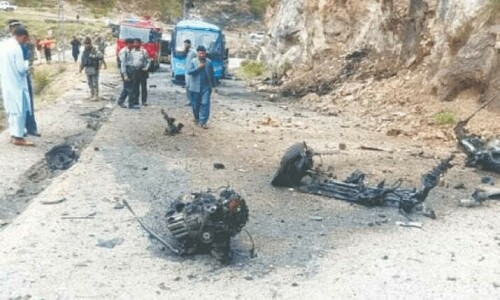KARACHI: The rich prevail at the cost of the weak. It is a tale often repeated and seen in play across centuries, borders and cultures. At Habib University on Friday, a similar dynamic was explored with reference to the mushrooming of gated communities in Karachi, only possible after the displacement of the poor residents of these areas.
‘Big housing projects and the dispossession of the native people of Karachi’ was the topic of discussion aimed to explore the gritty reality behind the glossy promise of a better life within these residential communities such as Naya Nazimabad, Bahria Town, Fazaia Housing Scheme and DHA City.
Gul Hassan Kalmati, historian and organiser of the Karachi Indigenous Rights Alliance, commended the debate on the usurping of the rights and land of the native people of Karachi. He explained how the Kalmati, Gabol, Burfat, and Jokhia tribes, including others living in areas such as Gadap and Malir, face fear and intimidation at the hands of those involved in several development projects.
“There was widespread harassment against the people who were unwilling to sell their land. There were threats to either send them to Balochistan and accuse them of being insurgents, or get them arrested on drug trafficking charges. They were given a choice between a cheque and a pair of handcuffs,” he said.
Mr Kalmati criticised the lack of support for their cause from elected representatives, courts, civil society organisations, and the media.
Dr Noman Ahmed, architect and urban planner, and chairman, Department of Architecture and Planning, NED University, gave a historical account of Karachi and how the city has been hijacked by individuals and institutions with vested interests.
“When Karachi was chosen to become the capital it was a small city with a meagre population. Many development plans were chalked out to make the city functional and sustainable. And the focus was to promote those areas of the city where agricultural and farming activities were ongoing.”
Dr Ahmed explained how much the Karachi Development Plan of 1973 was important to forward this aim. “The whole area, where the current housing development is under way, was targeted as an area that would profit Karachi as an integral agricultural area, and the local communities living there would be invested in.”
The idea was that if on the peripheries of Karachi a strong agricultural activity and related enterprises such as dairy farming etc were included, then the citizens of Karachi would benefit greatly from them. Consequent development plans adopted a similar approach, he said.
“However, after 1999, development started in the areas around the Superhighway. And this was possible largely because of the government’s policies of land allocation. With government land [in] plenty in Karachi as compared to other larger cities, instead of becoming an asset [it] became a liability as the government had the capacity to allot land as, when and to whom [it] pleased, especially in exchange for political support.”
Linguist and scholar Rahman Gul recalled the landscape of the areas currently under large-scale development and shared photos of several historical sites that have been compromised and bulldozed in the name of progress.
All panellists agreed that the citizens, especially the natives of Karachi, were being discriminated against in development. Resources such as water, they said, which all citizens had rights over, were being rerouted to certain housing societies, which would have catastrophic consequences in the near future.
Published in Dawn, May 13th, 2017













































Dear visitor, the comments section is undergoing an overhaul and will return soon.